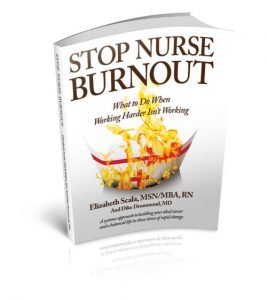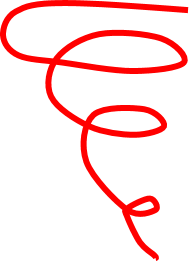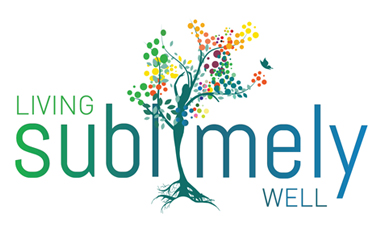Podcast: Play in new window | Download
What’s the Definition of Nurse Burnout?
For today’s post, I am covering another topic in our nurse burnout series. We’re going to uncover the correct definition of nurse burnout
In the article, The Way We Think About Nurse Burnout is Broken, one of the challenging issues stated was:
We call burnout something else. If you hear someone say, “I just need a break. I am stressed. I need to re-charge my batteries.” Watch out! Burnout is very different from stress. A nurse falling into the downward spiral of burnout needs much more help than someone who is experiencing a stressful event.
To answer this question, I would like to share an excerpt from my book, “Stop Nurse Burnout“.
WHAT IS THE DIFFERENCE BETWEEN BURNOUT AND NORMAL STRESS?
Stress is common. It’s a normal aspect of modern life. It’s nearly constant for a nurse on the job. With stress an ever-present condition for every practicing nurse, how can you tell the difference between the “normal” stress of practicing nursing and burnout?
 Before we get to that simple answer, let’s remember that stress is not always a bad thing. Without an appropriate amount of stress and challenge, the average human lapses into boredom and inactivity. The stress and responsibility of caring for patients is part of the motivation to do your best in every case. The perfectionism it inspires is a good thing for the patient. However, too much of that good thing is bad for the nurse.
Before we get to that simple answer, let’s remember that stress is not always a bad thing. Without an appropriate amount of stress and challenge, the average human lapses into boredom and inactivity. The stress and responsibility of caring for patients is part of the motivation to do your best in every case. The perfectionism it inspires is a good thing for the patient. However, too much of that good thing is bad for the nurse.
So, what is the difference between the normal stresses of the healthcare workplace and the syndrome of burnout? It’s really important that you and I get on the same page here in regards to this critical distinction.
Burnout is not about what is happening to you.
The difference between burnout and normal stress is not the nature of the external events that you find stressful. What one person finds to be stressful, a different person would experience as stimulating, exciting, and even fun. Everyone’s situation is unique.
Burnout is about whether or not you can cope with the things you find stressful.
The difference between simple stress and burnout is your ability to respond to and recover from the energy drain caused by the things that stress you out. Here’s a simple definition of nurse burnout.
With normal stress . . .
. . . You are able to recover with time off. You are able to maintain “energetic homeostasis.” You can recover your energy, enthusiasm, and drive with adequate rest. Your energy may be higher some days and lower on others. You notice the day-to-day fluctuation in your energy levels; however, you don’t feel overwhelmed or incapable of recovery from week-to-week.
With burnout . . .
 . . . You are unable to recover. Your energy enters the pattern of a relentless downward spiral. There comes a time when you notice you are not bouncing back, and you dread heading back into work. In most cases, a person suffering from burnout will eventually say something like, “I’m not sure how much longer I can go on like this.”
. . . You are unable to recover. Your energy enters the pattern of a relentless downward spiral. There comes a time when you notice you are not bouncing back, and you dread heading back into work. In most cases, a person suffering from burnout will eventually say something like, “I’m not sure how much longer I can go on like this.”
The only reason burnout rates can hover in the 30 percent range for decades and not destroy the profession of nursing is because we’ve been work-hardened to tolerate this energetic drain. Let’s face it: our training is a gladiator-style survival contest. We are conditioned to be able to cope with burnout better than all but a handful of other service-oriented professions—law enforcement and active duty military come immediately to mind.
This high-level overview will make one thing obvious. If you are burned out or headed in that direction, there is something about the stress of your job and the things you do now to recover that are not working.
You are leaking energy and not replenishing it, like a boat with a hole so large that bailing as fast as you can does not keep you from sinking.
This is why a vacation, sabbatical or retreat will never cure burnout. Simple time away from work will only provide temporary relief. If you don’t fundamentally change how you are working by taking different actions, when you return to the workplace after your break, the excess drain begins anew. There is still a hole in your boat.
For more… check out Stop Nurse Burnout by clicking here.
So nurse beware. Watch what you are labeling stress. Next time you hear yourself stating that you just need a break. Pause and ask yourself.
[Tweet “What’s the Definition of Nurse Burnout? Is it stress or is it burnout?”]
Let’s hear from you! Have you ever experienced nurse burnout? What definition of nurse burnout do you teach others or ascribe to yourself? What can you share with our readers to help them put a stop to nursing burnout?
About the Author: Keynote speaker and virtual conference host, Elizabeth Scala MSN/MBA, RN, partners with hospitals, nursing schools, and nurse associations to transform the field of nursing from the inside out. As the host of the Nurse’s Week program, The Art of Nursing, Elizabeth supports nursing organizations in celebrating and recognizing their staff in a meaningful way. Elizabeth received her dual master’s degree from Johns Hopkins University. She is also a certified coach and Reiki Master Teacher. Elizabeth lives in Maryland with her supportive husband and playful pit bull.

0 Comments
Trackbacks/Pingbacks